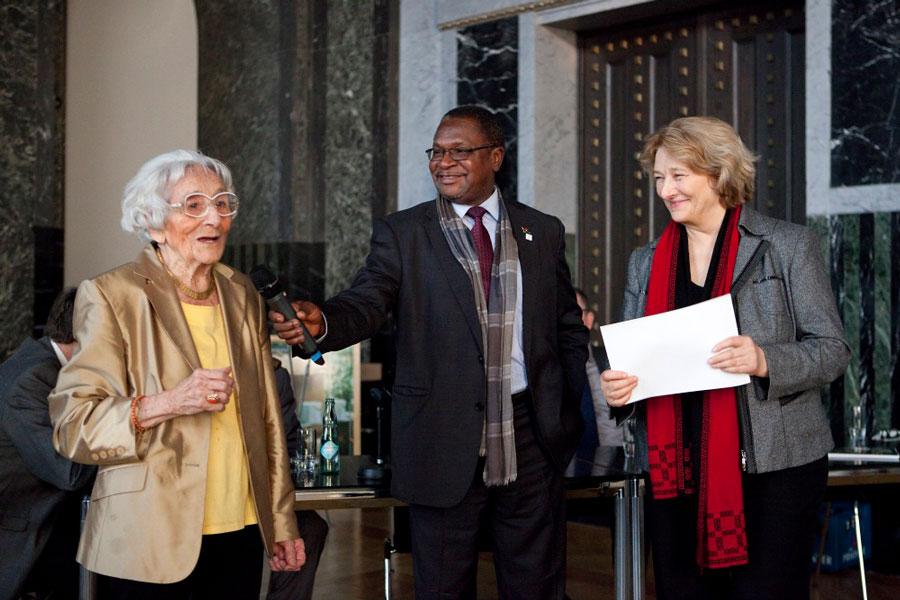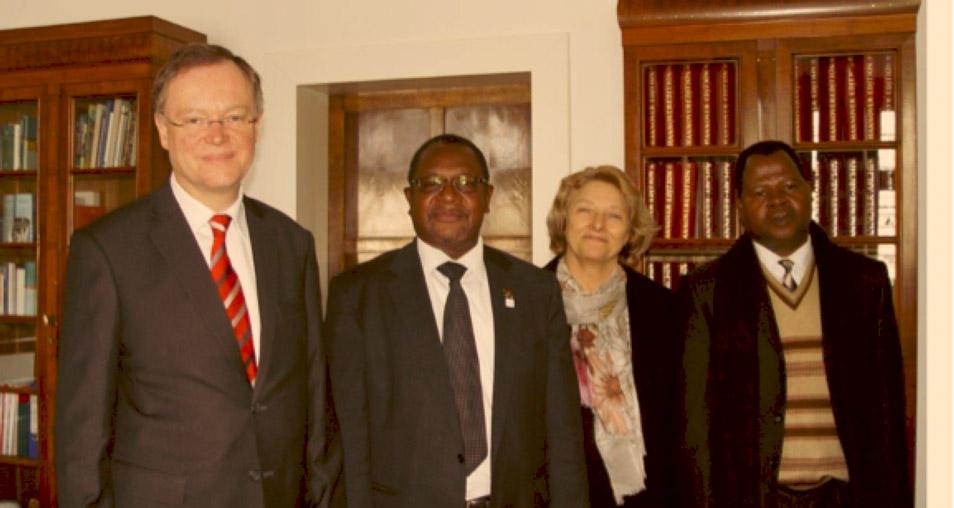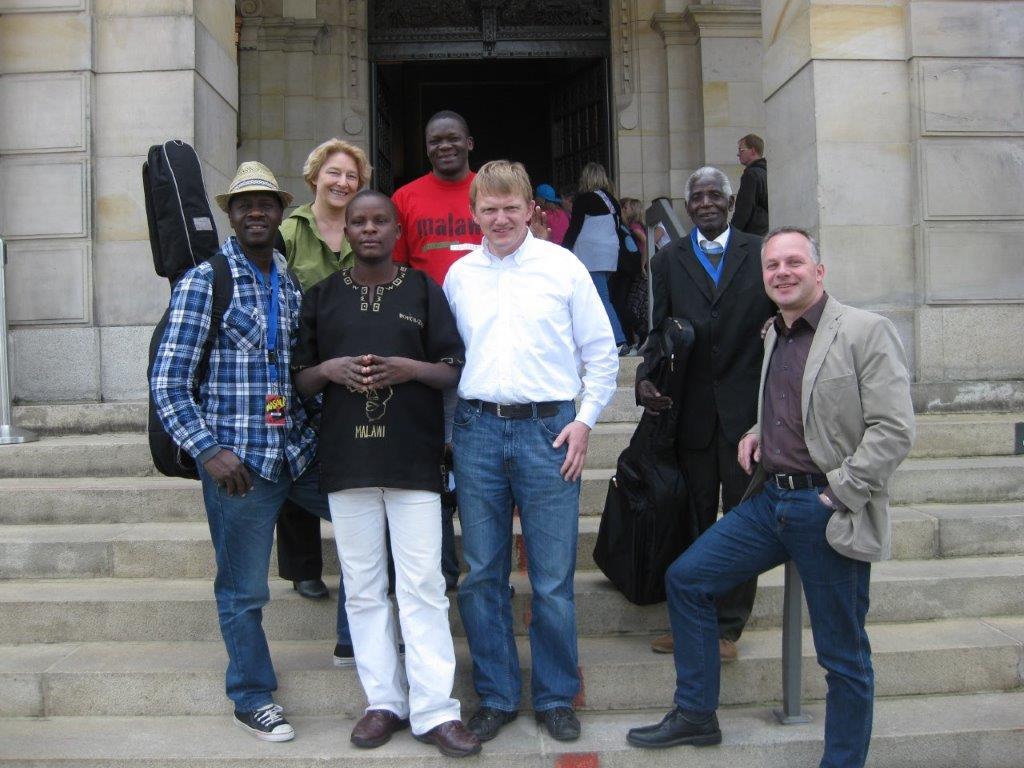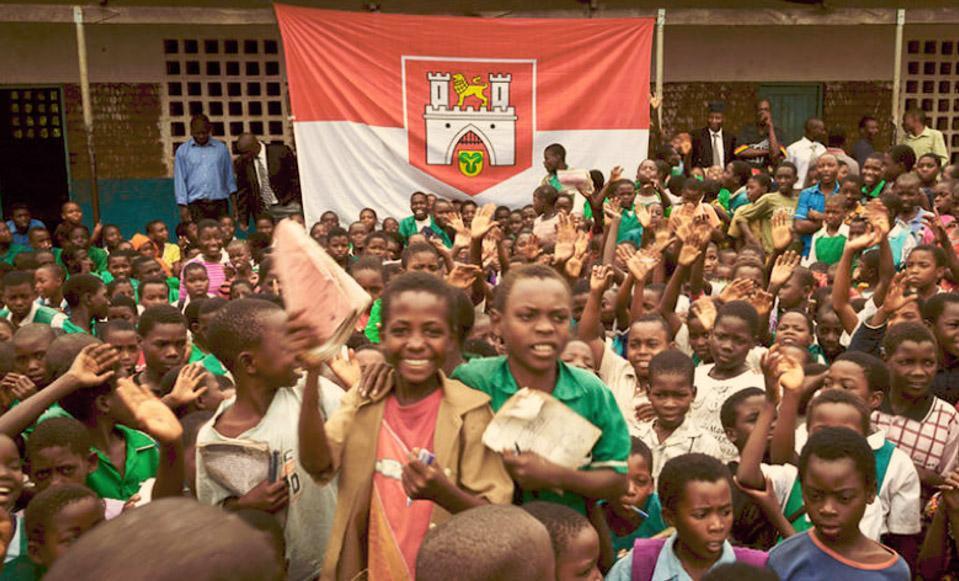2012
Mayor Stefan Weil welcomes the guests: City Director Ted Nandolo, Silvia Hesse, and Sylvester Mitini-Nkhoma, Commissioner for Environment, Recreation, and Culture.
Through the EU project "aware&fair," initiated in 2010 by the 1st Chairperson of the Friends' Circle and former head of the Agenda21 Office, Silvia Hesse, in collaboration with the Cultural Office of the City of Hannover and the sister cities Blantyre and Poznań, the partnership gained a new dimension. Implemented for the dissemination of the Millennium Development Goals (MDGs), the project fostered a lively exchange and many new experiences in the context of global learning, using fair-trade products and exploring questions such as how we want to live in the future and what kind of development we aspire to. In addition to fair trade, the cultural exchange in the fields of theater and music also played an equally important role. For more information, visit www.awarefair.org.
In the early 1960s, the "Friendship Circle Tanganyika" existed in Hannover. Committed citizens here made a contribution to international understanding. The "Friendship Circle Tanganyika" organized, among other events, an art exhibition titled "African Youth Paints and Creates." This exhibition reached a wide audience in the capital city of Lower Saxony.
2012
The Friendship Circle celebrated its 50th anniversary in Hannover.

Dr. Lore Henkel, co-founder of the Friendship Circle Malawi and the twinning partnership between Hannover and Blantyre, shows Ted Nandolo, the City Director of Blantyre, and Silvia Hesse, her successor, a photo from her last visit to Blantyre.

2010
In 2010, Silvia Hesse, the former head of the Agenda21 Office of the City of Hannover, was elected as the 1st Chairperson, taking over from Dr. Lore Henkel.
The "Freundeskreis Zentral- und Ostafrika e.V." was renamed to the "Freundeskreis Malawi und Städtepartnerschaft Hannover-Blantyre e.V." This change aimed to emphasize that the work of the Friendship Circle focuses on Malawi, the poorest country in Southeast Africa, often referred to as the "Warm Heart of Africa."

2000
In the following years, with the assistance of the City Student Council and the Federal Government, funds were raised for the construction of the MpiliMpili School in Makanjira, Malawi. Subsequently, with the financial support from the government of Lower Saxony, additional classrooms and a home economics center were built. In 2000, a teacher's residence was also constructed.
Furthermore, the Friendship Circle was able to send two mother and child healthcare buses to Malawi. A particular focus of the aid program lies in the training initiatives for the firefighting sector. Several tank fire trucks have been donated by the Hannover Fire Department to Blantyre.
On the occasion of Expo 2000, a delegation from Malawi visited the city of Hannover, which included the then head of the Department of Environment and Parking Spaces of Blantyre. Dr. Lore Henkel and Silvia Hesse met with him to learn more from each other.
1968

Due to their joint activities, in 1968, the Council of the City of Hannover, initiated by Willi and Dr. Lore Henkel, the founders of the Friendship Circle, decided to sign a twinning partnership between Blantyre and Hannover. The Friendship Circle was entrusted by Malawi's then President Banda to foster the relationship with Makanjira and to take care of the MpiliMpili School and the empowerment of women.
(Note: The name "MpiliMpili" is kept as is, assuming it is a specific name or term used in the context.)
1964
The "Freundeskreis Tanganyika" was renamed and continued as the association "Freundeskreis Zentral- und Ostafrika e.V.," with the active involvement of the couple Dr. Lore and Willi Henkel. From the very beginning, the "Freundeskreis Zentral- und Ostafrika e.V." served as the connecting link for all activities between Blantyre/Malawi and Hannover/Germany.
During Malawi's independence in 1964, the German government initiated aid actions, which were supported by the Friendship Circle. In the year of independence, the first German ambassador reached out to the city of Hannover, leading to the support and training of midwives, pediatric nurses, and rural assistants by the Friendship Circle. Members of the Friendship Circle took the invitation back home, and as a result, ten young women were able to undergo nurse training at the Oststadtkrankenhaus Hannover (East City Hospital Hannover). After completing a three-year education, they took their exams in Germany and have since been working in responsible positions in Malawi.
1963
Malawian Prime Minister Dr. H. Kamuzu Banda visited the Federal Republic of Germany for the first time. At the beginning of the sixties, discussions focused on Africa's liberation from colonialism and the education of young people. As part of this effort, ten promising young midwives were selected from Malawi and later four pediatric nurses and four social workers were chosen and sent to Hannover the following year for training.
1962
In March 1962, a delegation of young Malawians embarked on their first informational trip to the Federal Republic of Germany. This experience inspired them with interesting ideas for collaborative projects.
1960 er
At the beginning of the 1960s, the "Friendship Circle Tanganyika" existed in Hannover. Committed citizens here made a gesture towards international understanding. The "Friendship Circle Tanganyika" organized, among other events, an art exhibition titled "African Youth Paints and Creates." This exhibition reached a broad audience in the capital city of Lower Saxony.









